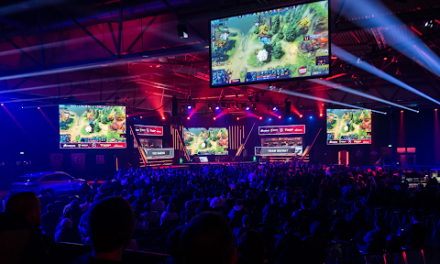The gaming sector is evolving rapidly, driven by a worldwide surge in gamers and a rising interest in gaming activities. The gaming market is expected to grow further, with the global gaming market anticipated to swell from USD 272.86 billion to an astonishing USD 426.02 billion by 2029, showcasing a robust annual growth rate of 9%. Significant factors underpin this surge, including the ascendancy of mobile gaming, the proliferation of online multiplayer experiences, and groundbreaking advancements in virtual and augmented reality technologies.
The gaming landscape of 2024 shows the industry’s ability to innovate and adapt, offering gamers an increasingly diverse array of options. From immersive VR headsets that transport players to otherworldly realms to AR technologies that merge digital play with the physical world, the opportunities for new gaming experiences are boundless.
The Rise of Game Streaming and Mobile-to-PC Transitions
Streaming games have become a practical reality in 2024, with major players like Amazon, Nvidia, and Xbox Game Pass improving their services. Sony’s introduction of the PlayStation Portal, which quickly sold out, indicates a robust market for high-quality game streaming. ChromeOS has also made strides in gaming with various devices, signaling a broader acceptance and integration of streaming technologies in mainstream gaming.
Parallel to the streaming revolution, a significant trend is the transition of mobile games to PC and console platforms. Titles like Honkai: Star Rail exemplify this shift, indicating that Genshin Impact’s success wasn’t an anomaly. With the narrowing gap between mobile and console production values, expect to see more mobile games making their mark on traditional gaming platforms.
The Integration of Generative AI
Generative AI will become a central topic of discussion in 2024, especially in game development. While AI image generation has its ethical debates, AI tools are increasingly used for coding, VFX, and even NPC scripting.
These tools, including Microsoft’s Copilot and Nvidia’s AI solutions, are aiding small development teams in enhancing creativity and efficiency.
Virtual Gaming
The VR gaming landscape has transformed, offering players immersive experiences with advanced VR headsets and games. Options like Meta Quest 2 or 3 balance features and affordability, while high-end models like the Valve Index offer precision and performance for a more immersive experience. Sports simulations in VR, such as tennis and basketball, have seen remarkable improvements, offering players realistic gameplay that mirrors physical play. Games like Eleven Table Tennis and various VR basketball experiences allow players to engage in the sport as if they were on an actual court or field, with the added convenience of playing from their living room.
The realism these simulations bring extends to visuals, physics, and player interactions, enhancing the overall gameplay and making it enjoyable for both novices and seasoned gamers.
The casino sector has also embraced VR, offering players immersive gambling experiences from the comfort of their homes. Top online casino USA platforms allow users to engage in virtual poker and other casino games, providing a virtual environment replicating the ambiance and interaction of a physical casino.
A Nostalgic Return and Local Multiplayer Revival
The gaming industry is experiencing a resurgence of nostalgia, with remakes and remasters becoming more prevalent. Companies like Sony, Microsoft, and Nintendo are tapping into this nostalgia, offering access to classic titles through subscription services. This trend is not just about bringing old games to new audiences but also about preserving and celebrating gaming history.
Local multiplayer games are also witnessing a renaissance, with a noticeable increase in gamers seeking co-op or split-screen experiences. This shift towards local play reflects a broader desire for social connections through gaming, countering the prevailing trend of online multiplayer dominance.
Competitive Platforms and Cloud Gaming
The rise in esports popularity and the expansion of esports tournaments and games significantly influence the competitive landscape among game distribution platforms. Epic Games and GOG.com are at the forefront of challenging Steam’s dominance, offering unique gaming libraries and attractive features to cater to the esports community.
Epic Games, known for its blockbuster title Fortnite, has capitalized on its esports success to draw players and viewers, enhancing its platform’s appeal. Similarly, GOG.com offers DRM-free games, appealing to casual and competitive gamers looking for unrestricted access to their game libraries.
Cloud gaming is another area experiencing rapid growth, addressing common frustrations like long download times and hardware limitations. By streaming games directly, services enable gamers to enjoy high-quality gaming experiences without the need for advanced hardware, further democratizing access to the latest games.
Final Thoughts
The PC gaming landscape in 2024 is vibrant and diverse, marked by technological advancements and a deepening integration of AI, streaming services, and cloud gaming.
The resurgence of nostalgic elements and local multiplayer experiences adds social connection and historical appreciation to the industry. With these trends progressing, the future of gaming looks more accessible, immersive, and diverse, reshaping the experience in unparalleled ways.









![[Rumor] GTA 6 to be digital-only at launch… to avoid story spoilers](https://vgleaks.com/wp-content/uploads/2024/03/gta-6-150x150.jpg)
![[Rumor] Resident Evil: Code Veronica remake could be announced this year and launch in 2027](https://vgleaks.com/wp-content/uploads/2026/01/resident-evil-code-veronica-150x150.jpg)



